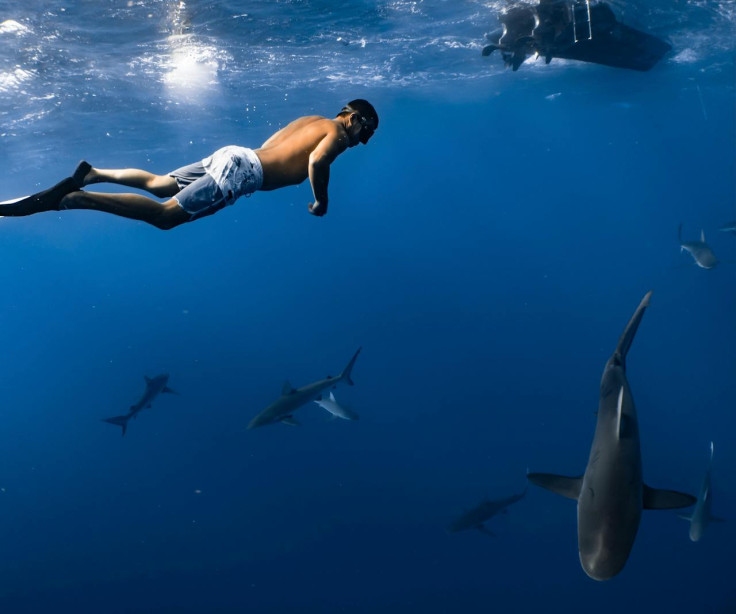Did Sharks Really Eat a Snorkeler? 'Friendly' Species Turns Fatal After Feeding Frenzy Linked to Human Handouts
A snorkeller was killed by dusky sharks off Hadera, marking the first recorded fatal incident involving the usually harmless species

A snorkelling trip off the coast of Hadera, Israel, ended in tragedy when a man was fatally attacked by a group of sharks usually regarded as harmless. Witnesses said the 40-year-old tourist was surrounded by dusky sharks while filming with a GoPro about 100 metres from shore. The attack, captured partly on video, shocked locals and researchers who had long observed the species feeding peacefully in the area.
Investigators later confirmed that multiple sharks had bitten and consumed the victim, turning what began as an isolated attack into a rare multi-shark feeding event. Forensic analysis of recovered remains indicated the man was first struck near the head or torso, triggering a frenzy that drew in dozens of other sharks. Marine scientists have since classified the case as the first fatal incident worldwide involving dusky sharks.
Authorities have said the investigation remains ongoing, and international marine databases have yet to independently verify all details of the attack. Researchers, however, agree that the event raises pressing questions about how human activity can alter animal behaviour and heighten risk in coastal waters. Warm water released from a nearby power station, combined with reports of tourists feeding sharks, may have created an artificial feeding zone that blurred the boundary between curiosity and predation.
An Unprecedented Attack from a 'Quiet' Species
Witnesses described seeing fins circling and the water turning red, according to The Independent. Dusky sharks, common in the eastern Mediterranean, have previously had no recorded fatal interactions with humans. Marine biologists called the event 'unprecedented', noting that the sharks' behaviour appeared to shift rapidly from investigative to aggressive once blood entered the water.
Experts believe several environmental and human factors converged to create ideal conditions for confusion and aggression. The nearby Orot Rabin power station discharges heated water that attracts fish, drawing sharks closer to shore. Tourists and local boat operators were also reported to have thrown food scraps into the water to entertain swimmers. Over time, the animals may have learned to associate human presence with feeding opportunities.
Marine biologist Kristian Parton told ExplorersWeb that competition for food can override normal behaviour, creating chaotic group feeding. 'The only way to prevent this is a total ban on all artificial feeding of sharks by the public,' he said. Researchers also suggested that the snorkeller's GoPro or swimming movements may have resembled prey, prompting the first bite and setting off the frenzy that followed.
Investigators have revealed that thr April, 2025 fatal shark attack in Hadera, Israel may have been linked to his GoPro, and humans feeding sharks in the area.
— Leslie Young 🎗️ (@AkaLazarus) August 26, 2025
Hadera Beach waters swarm with dusky sharks, drawn by the warm water from the nearby Orot Rabin Power Station. Usually,… pic.twitter.com/QUEXKLbTVE
📸 Wild footage of a woman literally falling directly on top of a shark at Hadera Beach, Israel. pic.twitter.com/seytB5KImn
— Kagan.Dunlap (@Kagan_M_Dunlap) April 22, 2025
A former Israeli soldier, who served in the 8207 battalion has died following a shark attack off the coast of Hadera, Israel.
— In Context (@incontextmedia) April 23, 2025
Beach goers filmed the shark close to shore, moments before Barak Tzach was attacked. pic.twitter.com/dZRnGvtCdD
Rethinking Safety and Species Behaviour
The Hadera incident has prompted renewed scrutiny of how human interference reshapes marine ecosystems and predator patterns. A species once considered low-risk became dangerous only after its environment and feeding habits were disrupted, experts say. While demonising sharks is misleading, scientists argue that stricter controls on feeding practices, industrial discharge and wildlife tourism may be essential to prevent similar tragedies.
Marine biologists view such events as symptoms of ecological imbalance rather than deliberate aggression. Studies show that repeated human presence and altered prey availability can condition sharks to behave unpredictably. The case underscores how quickly human disruption can transform natural behaviour, turning a typically safe habitat into one of unexpected and tragic danger.
© Copyright IBTimes 2025. All rights reserved.





















